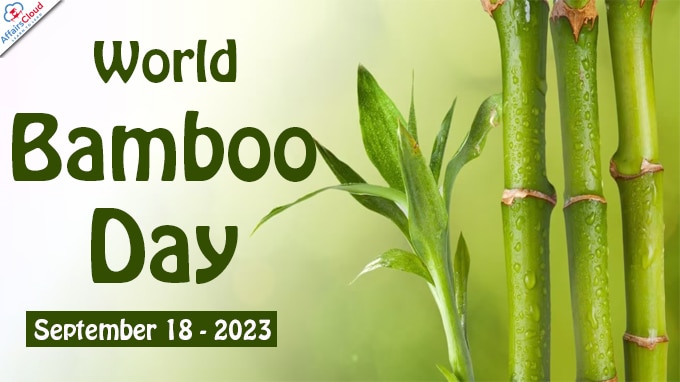 World Bamboo Day is annually observed across the globe on September 18 to create awareness about bamboo and to bring the potential of bamboo to a more elevated exposure.
World Bamboo Day is annually observed across the globe on September 18 to create awareness about bamboo and to bring the potential of bamboo to a more elevated exposure.
- The annual observance of World Bamboo Day is led by the World Bamboo Organisation (WBO), an international coordinating body for bamboo practitioners.
Significance of the observance:
- To protect natural resources and the environment.
- To ensure sustainable utilization.
- To promote new cultivation of bamboo for new industries in regions around the world.
- To promote traditional uses locally for community economic development.
Background:
i.In 2009, during the 8th World Bamboo Congress in Bangkok, Thailand the World Bamboo Organisation (WBO), with the support of the Royal Forest Department of Thailand, formally recognised 18th September as World Bamboo Day.
- The observance was initiated by Kamalesh Salam from Assam who served as the President of WBO from 2007 to 2009.
ii.Around 100 countries agreed to commemorate 18th September as World Bamboo Day.
iii.The 1st ever Bamboo Day was celebrated on 18th September 2009 in Bangkok, Thailand.
- The 18th of September is annually observed as the Royal Thai Forest Day in Thailand.
About Bamboo:
i.The Bamboos (Bambusoidaea) consists of 1439 different species in 116 genera.
ii.It is one of the 12 subfamilies of the grass family (Poaceae) and one of the tallest species of the Poaceae family.
iii.Bamboo is the world’s fastest producer of biomass and can be used for anything from the production of paper or clothing.
iv.Some species spread aggressively and can form a dense undergrowth that excludes other plants.
v.Bamboos are distributed across the tropical and subtropical to mild temperate regions. Most species of bamboo are native to Asia and the islands of the Indian and Pacific Oceans.
Bamboo in India:
i.In India, the Indian Forest Act of 1927 declared bamboo as a tree which prohibited it from cutting and transporting.
ii.Later in 2017, the amendment of section 2(7) declared bamboo is not a tree and does not require permission for felling and transporting.
- Therefore, bamboo grown on private or homestead land by farmers does not require a felling permission or transit permission.
UN Report on “Bamboo’s Role in the Shift to Bio-Based Building Materials”:
United Nations (UN) has unveiled a comprehensive report titled “Building Materials and the Climate: Constructing a New Future” which highlights the role of bamboo in the transition to bio-based building materials.
The report noted the importance of replacing traditional building materials such as legacy concrete and steel with sustainable, renewable alternatives.
Key Points:
i.The report focuses on the importance of regulations that prevent practices like the clear-cutting of forests to ensure the sustainability of bamboo sourcing.
ii.Bamboo’s potential to reduce carbon emissions significantly is its most significant contribution to construction.
iii.The report stated that Bamboo’s versatility, rapid growth, ability to grow on degraded lands, and carbon-reduction potential make it a perfect candidate for efforts towards mitigating climate change.
About World Bamboo Organisation(WBO):
WBO was initially founded as the “International Bamboo Association (IBA)” in 1992 and later renamed as the “World Bamboo Organization”.
Executive director & CEO – Susanne Lucas
Headquarters –Boston, Massachusetts,United States of America(USA)




